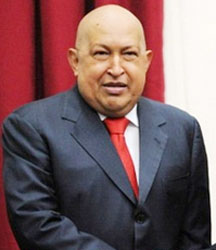CARACAS, (Reuters) – Venezuelan President Hugo Chavez said yesterday that his country would not recognize any ruling by a World Bank tribunal in a multibillion-dollar arbitration case with Exxon Mobil Corp.

Exxon took Venezuela to the World Bank’s International Center for Settlement of Investment Disputes, or ICSID, seeking as much as $12 billion in compensation after Chavez ordered the nationalization of the Cerro Negro oil project in 2007.
“I tell you now: we will not recognize any decision by ICSID,” Chavez said during a televised speech. He has repeatedly accused the U.S. oil major of using unfair deals in the past to “rob” the South American OPEC member of its resources.
“They are immoral … How much could they steal in 50 years? Who would dare launch this madness without any foundation? They wanted $12 billion. From where, compadre?” he said.
“We are not going to bow before imperialism and its tentacles, understand that … They are trying the impossible: to get us to pay them. We are not going to pay them anything.”
An Exxon spokesman said the company had no comment.
Some interpreted the president’s remarks as meaning Venezuela would reject rulings in any of about 20 other cases that it faces before the World Bank’s tribunal, all triggered by a wave of state takeovers in recent years.
They include separate multibillion-dollar proceedings brought by another U.S. oil major, ConocoPhillips.
But two statements issued later, by Venezuela’s Petroleum and Mining Ministry and by its state oil company PDVSA, only referred to Chavez saying the nation would refuse to recognize a verdict in the Exxon case.
Last week another arbitration panel, of the International Chamber of Commerce, awarded Exxon $908 million in a separate case relating to the Cerro Negro nationalization, turning attention to the ongoing World Bank proceedings.
RESOURCE NATIONALISM
On Saturday, Venezuelan Oil Minister Rafael Ramirez told Reuters he did not expect a verdict in Exxon’s World Bank case before the end of this year.
It is due to start being argued in February, Exxon says.
Both cases have been closely watched by the industry for precedents in future disputes between companies and producing states, which have increasingly sought a greater share of oil revenue as prices soar and new reserves become tougher to find.
For years, Venezuela’s socialist leader has accused foreign oil companies of plundering the nation’s reserves, but has also maintained close ties with many of them.
Lawyers consulted by Reuters said the ICC decision only covered a commercial dispute between Exxon and state oil company PDVSA over earnings Exxon lost as a result of the takeover.
Exxon says the World Bank case is for compensation for its assets, and experts say it could yield a larger award.
The government has insisted Exxon receive only slightly more than the $750 million it said is invested in the project. Last September, Venezuela offered to settle for $1 billion.
For years, Chavez has confronted oil companies with tax hikes and contract changes aimed at increasing revenue from the industry to fund state-led anti-poverty development programs.
Venezuela’s push to boost control over its oil industry has been followed by similar efforts in other producing nations. Critics say it has scared investors away from the South American OPEC member and left crude production stagnant.
But some oil companies have remained eager to invest in Venezuela’s Orinoco extra heavy oil belt, which is considered one of the world’s largest mostly untapped reserves of crude.
U.S. major Chevron and Spain’s Repsol both signed deals in 2010 for new multibillion-dollar projects there.
